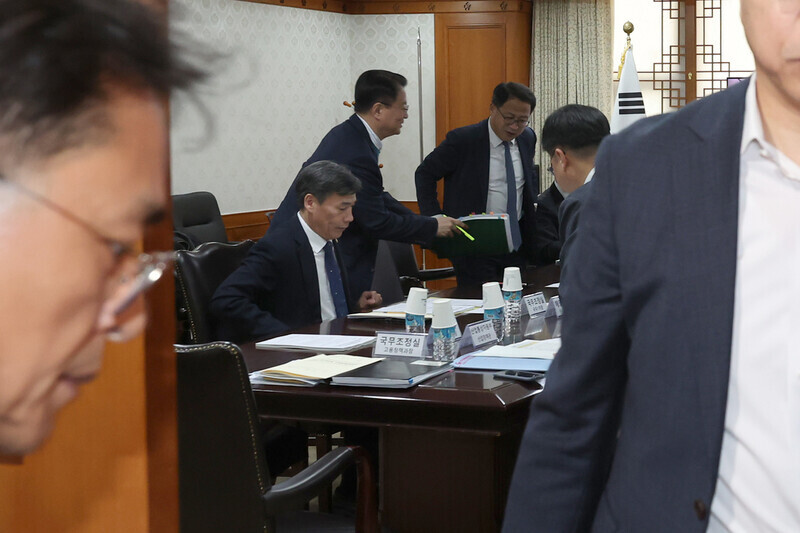hankyoreh
Links to other country sites 다른 나라 사이트 링크
Korea to issue record 165,000 E-9 visas next year, allow foreigners to work in more industries

Korea will allow a record 165,000 foreigners to work in the country under the employment permit system in 2024. The range of businesses where they can work will also be expanded to include restaurants, forestry and mining.
Labor circles have voiced criticism of the policy, saying it makes no assurances for the fair treatment of foreign workers and fails to consider the impact on the domestic labor market.
The government convened its Foreign Workforce Policy Committee at the Seoul government complex on Monday to finalize the 2024 plan for the added introduction of foreign labor and its plan to allow new industries under the employment permit system.
The employment permit system issues E-9 visas (non-professional work visas) so that small and medium-sized enterprises facing labor shortages can hire foreign workers. The annual employment quota, which was set at 50,000 to 60,000 until 2022, has increased sharply since the Yoon Suk-yeol administration took office, jumping to 120,000 in 2023 and 165,000 for 2024. This will be the largest number of E-9 visas to be issued in a year since the employment permit system was implemented in 2004.
“As structural factors such as the decline in the productive population remain, the demand for foreign labor [permits] continues, especially in some service industries with a high proportion of vacancies,” the government said in its explanation of the significant expansion of the foreign labor employment quota for 2024.
The distribution of labor by industry shows that the number of foreign workers allowed in the service industry will nearly quintuple from 2,870 in 2023 to 13,000 in 2024.
The industries E-9 holders are allowed to work in will also be expanded to include restaurants, forestry and mining. In the case of restaurants, the process of introducing foreign labor is expected to begin in April 2024 through applications from business owners.
Initially, foreigners will be allowed to work as kitchen assistants in Korean restaurants in 100 cities, counties, and districts (including Sejong and Jeju) across the country, after which the government will consider taking the program nationwide. Until now, the only foreigners allowed to work in restaurants were Chinese (overseas) compatriots or international students.
Forestry and mining companies, which have been unable to recruit Korean workers due to poor working conditions, will also be able to apply for foreign workers from July next year.
“We urge the government to immediately put a halt to this half-hearted, rushed policy that does not consider how the domestic labor market may be impacted, that was put forth without in-depth conversations with the labor community in relevant industries or evaluating improving the existing industries with permits,” the Federation of Korean Trade Unions wrote in a press release.
By Kim Hae-jeong, staff reporter
Please direct questions or comments to [english@hani.co.kr]

Editorial・opinion
![[Column] Tariffs on China: Trump was dumb, Biden dumber [Column] Tariffs on China: Trump was dumb, Biden dumber](https://flexible.img.hani.co.kr/flexible/normal/500/300/imgdb/original/2024/0520/191716191153918.jpg) [Column] Tariffs on China: Trump was dumb, Biden dumber
[Column] Tariffs on China: Trump was dumb, Biden dumber![[Column] What if Seoul took reunification by force off the table? [Column] What if Seoul took reunification by force off the table?](https://flexible.img.hani.co.kr/flexible/normal/500/300/imgdb/original/2024/0520/3017161928630494.jpg) [Column] What if Seoul took reunification by force off the table?
[Column] What if Seoul took reunification by force off the table?- [Editorial] Intensifying US-China rivalry means Seoul must address uncertainty with Beijing sooner than later
- [Column] When ‘fairness’ means hate and violence
- [Editorial] Yoon must stop abusing authority to shield himself from investigation
- [Column] US troop withdrawal from Korea could be the Acheson Line all over
- [Column] How to win back readers who’ve turned to YouTube for news
- [Column] Welcome to the president’s pity party
- [Editorial] Korea must respond firmly to Japan’s attempt to usurp Line
- [Editorial] Transfers of prosecutors investigating Korea’s first lady send chilling message
Most viewed articles
- 1Xi, Putin ‘oppose acts of military intimidation’ against N. Korea by US in joint statement
- 2Kim Jong-un wanted to meet with residents of shelled Yeonpyeong Island in South, Moon recalls in mem
- 3To weigh costs and benefits, Korea must stop treating US troop presence as a sacred cow
- 4[Column] What if Seoul took reunification by force off the table?
- 5Berlin mayor hints at tearing down ‘comfort women’ memorial in city
- 6[Column] Tariffs on China: Trump was dumb, Biden dumber
- 7[Editorial] Transfers of prosecutors investigating Korea’s first lady send chilling message
- 8Naver’s union calls for action from government over possible Japanese buyout of Line
- 9[Exclusive] Truth commission to seek additional murder charges for figures behind 1980 Gwangju massa
- 10[Column] US troop withdrawal from Korea could be the Acheson Line all over